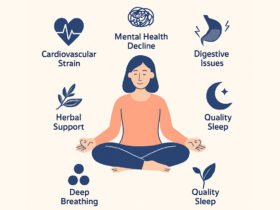Introduction
In our fast-paced, hyper-connected world, it’s easy to become mentally overwhelmed and emotionally drained. Mindfulness offers a powerful antidote. Rooted in ancient practices and validated by modern science, mindfulness helps you become more aware of the present moment, reduce mental clutter, and build emotional resilience.
By incorporating simple daily practices, you can experience greater mental clarity, emotional stability, and overall wellbeing—no matter how busy life gets.
What Is Mindfulness?
Mindfulness is the practice of consciously focusing your attention on the present moment without judgment. It means noticing your thoughts, feelings, bodily sensations, and surroundings with curiosity and calm. Over time, mindfulness strengthens the brain’s ability to handle stress and increases awareness, improving both mental and emotional health.
Benefits of Mindfulness
-
Reduces stress and anxiety
-
Enhances concentration and memory
-
Improves emotional regulation
-
Supports better sleep and energy
-
Builds self-awareness and compassion
Top Mindfulness Practices to Try
Here are some effective and accessible ways to incorporate mindfulness into your daily routine:
1. Mindful Breathing
Take a few minutes daily to focus only on your breath. Inhale slowly through your nose, exhale through your mouth, and observe the rhythm. If your mind wanders, gently bring it back. This simple act helps anchor your attention and calms the nervous system.
2. Body Scan Meditation
This practice involves mentally scanning your body from head to toe, noticing areas of tension or discomfort. It promotes physical relaxation and increases awareness of how emotions manifest in the body.
3. Journaling With Awareness
Each morning or evening, spend five minutes writing down your thoughts without judgment. This helps declutter your mind, identify emotional triggers, and reflect on what truly matters to you.
4. Mindful Walking
Instead of rushing from place to place, try walking mindfully. Pay attention to the sensation of your feet touching the ground, the rhythm of your steps, and the environment around you. It’s an excellent way to ground yourself during a busy day.
5. Gratitude Practice
Take time each day to reflect on three things you’re grateful for. This simple habit shifts your focus from what’s lacking to what’s abundant, improving mood and emotional balance.
6. Digital Detox Moments
Schedule short breaks to unplug from devices and reconnect with the present. Use this time to notice your surroundings, stretch, or just sit quietly.
7. Mindful Eating
Before eating, pause and appreciate your food. Notice the textures, colors, smells, and flavors. Eating with awareness enhances digestion and reduces overeating triggered by stress or distraction.
How to Make It a Habit
-
Start small – Just 5–10 minutes a day is enough to see benefits.
-
Be consistent – Choose a regular time (morning or bedtime).
-
Use prompts – Apps, sticky notes, or reminders can help you stay on track.
-
Stay kind to yourself – Mindfulness is about progress, not perfection.
Conclusion
Incorporating mindfulness into your daily life doesn’t require big changes—it starts with small, intentional moments of presence. Whether you’re aiming for better focus, emotional control, or simply peace of mind, these mindfulness practices can help you regain clarity and balance in a hectic world.











Leave a Reply